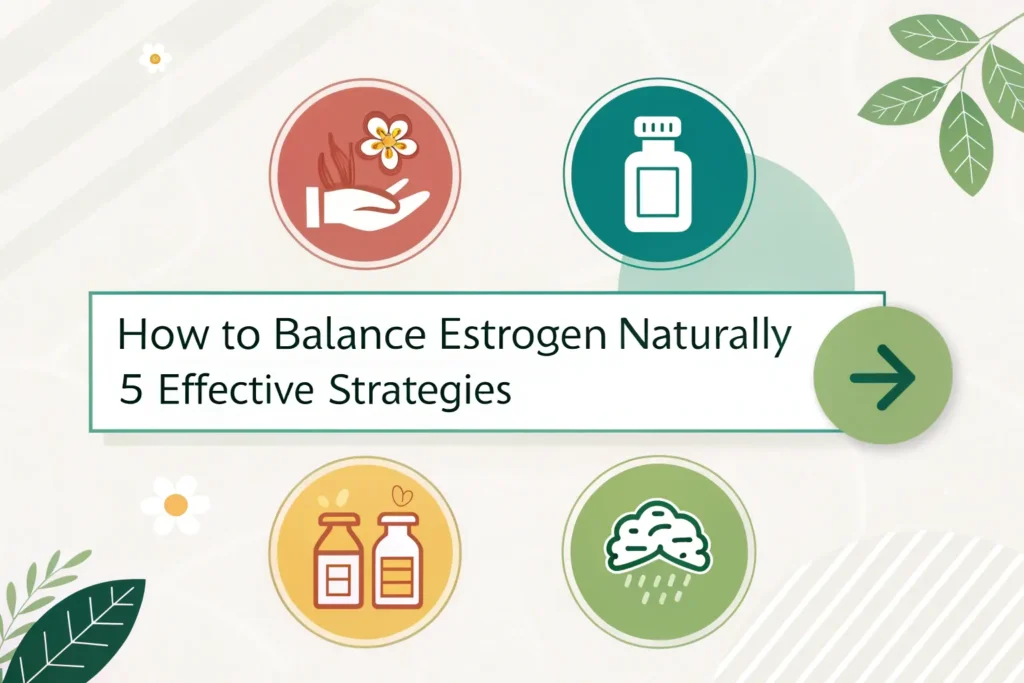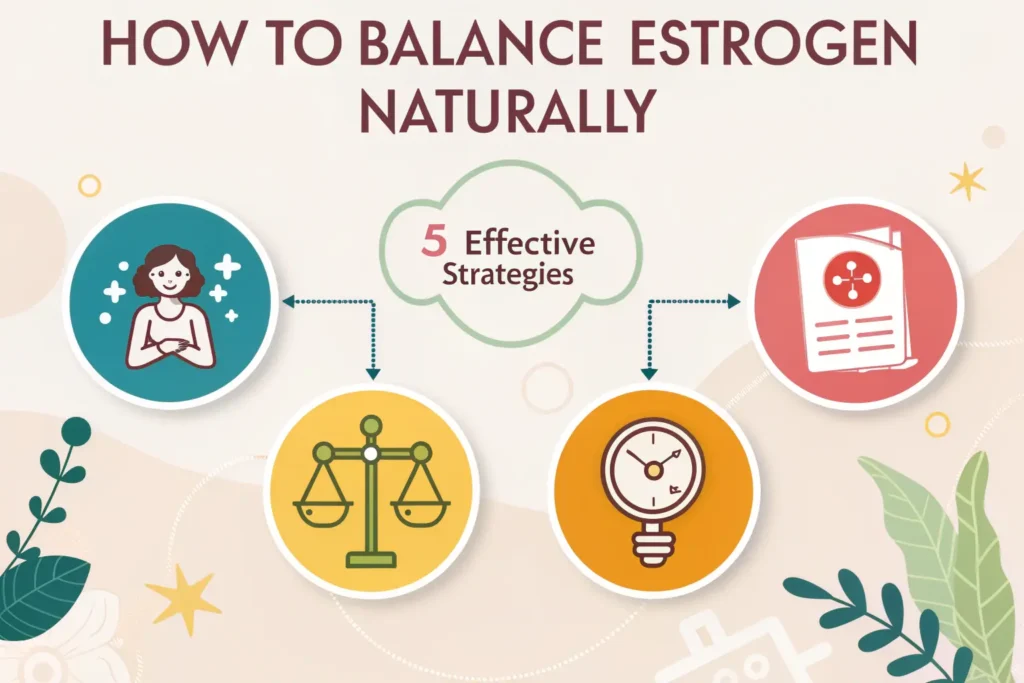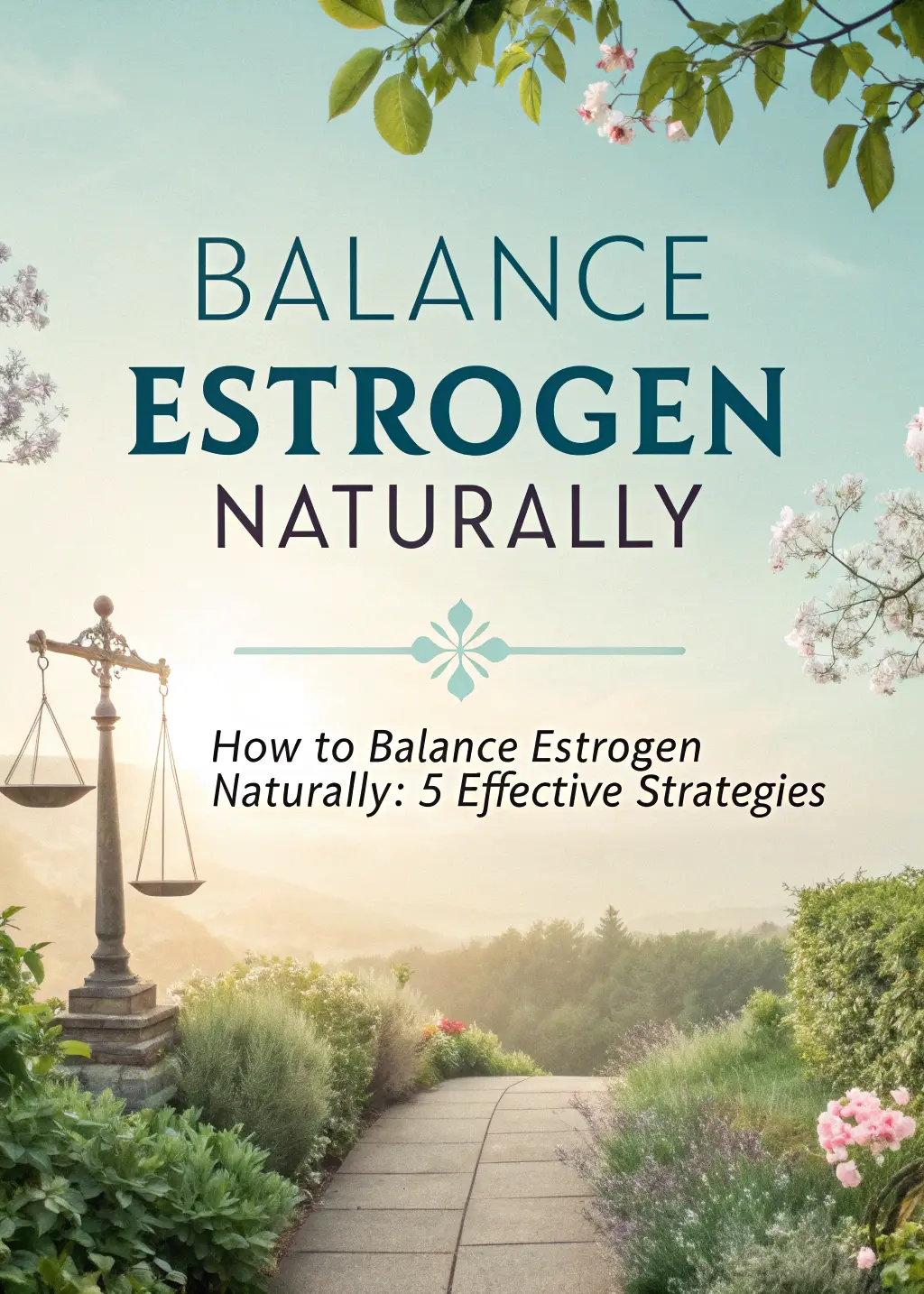Estrogen plays a crucial role in women’s health, affecting everything from reproductive function to bone density, mood, and cardiovascular health. When estrogen levels become imbalanced—whether too high or too low—it can lead to a range of uncomfortable symptoms including irregular periods, mood swings, weight gain, fatigue, and sleep disturbances.
The good news is that there are natural, evidence-based strategies you can implement to help support healthy estrogen balance. Here are five effective approaches that can make a meaningful difference in your hormonal health.
Table of Contents

1. Optimize Your Diet with Hormone-Supporting Foods
What you eat directly impacts your hormone production and metabolism. Focus on incorporating these key food groups:
Cruciferous Vegetables: Broccoli, cauliflower, Brussels sprouts, and kale contain compounds called indoles that help your liver process estrogen more efficiently. These vegetables support the production of beneficial estrogen metabolites while reducing harmful ones.
Healthy Fats: Omega-3 fatty acids from sources like wild-caught salmon, walnuts, and flaxseeds are essential for hormone production. These fats also help reduce inflammation, which can interfere with healthy hormone balance.
Fiber-Rich Foods: Adequate fiber intake helps your body eliminate excess estrogen through proper digestion. Aim for 25-35 grams daily from sources like beans, lentils, quinoa, and vegetables.
Phytoestrogen-Rich Foods: Moderate amounts of soy products, flaxseeds, and sesame seeds contain plant compounds that can help modulate estrogen activity in the body, potentially reducing symptoms of both estrogen excess and deficiency.
2. Support Your Liver’s Detoxification Process
Your liver is responsible for metabolizing and eliminating excess estrogen from your body. Supporting optimal liver function is crucial for hormonal balance:
Stay Hydrated: Drink plenty of filtered water throughout the day to help your liver flush out toxins and hormone metabolites.
Limit Alcohol: Excessive alcohol consumption can impair liver function and increase estrogen levels. If you drink, do so in moderation.
Include Liver-Supporting Foods: Green tea, turmeric, garlic, and beets contain compounds that support liver detoxification pathways. Milk thistle and dandelion root are also traditional herbs known for their liver-supporting properties.
Reduce Toxic Load: Minimize exposure to environmental toxins that can burden your liver, such as processed foods, pesticides, and harsh cleaning chemicals.
3. Manage Stress and Prioritize Sleep
Chronic stress and poor sleep can significantly disrupt hormone balance, including estrogen levels:
Stress Management Techniques: Practice regular stress-reduction activities such as meditation, deep breathing exercises, yoga, or spending time in nature. Chronic stress elevates cortisol levels, which can interfere with estrogen production and metabolism.
Quality Sleep: Aim for 7-9 hours of quality sleep each night. Poor sleep disrupts the delicate balance of hormones, including estrogen. Create a consistent bedtime routine and optimize your sleep environment by keeping your bedroom cool, dark, and quiet.
Mindful Movement: Gentle forms of exercise like yoga, tai chi, or walking can help reduce stress hormones while supporting overall hormonal health.
4. Maintain a Healthy Weight Through Balanced Exercise
Body weight and estrogen levels are closely connected, as fat tissue can produce estrogen:
Regular, Moderate Exercise: Engage in regular physical activity that includes both cardiovascular exercise and strength training. Aim for 150 minutes of moderate-intensity exercise per week, as recommended by health authorities.
Avoid Excessive Exercise: While regular exercise is beneficial, excessive or intense training can actually disrupt hormone balance. Listen to your body and allow adequate recovery time.
Strength Training: Building lean muscle mass helps improve insulin sensitivity and supports healthy metabolism, both of which are important for hormone balance.
Find Activities You Enjoy: Sustainable exercise habits are more likely to develop when you choose activities you genuinely enjoy, whether that’s dancing, swimming, hiking, or playing sports.
5. Consider Natural Supplements and Herbs
Certain supplements and herbs have been shown to support healthy estrogen balance:
Adaptogenic Herbs: Ashwagandha, rhodiola, and holy basil can help your body adapt to stress and support overall hormonal balance.
Vitamins and Minerals: B-complex vitamins, vitamin D, magnesium, and zinc all play important roles in hormone production and metabolism. Consider having your levels tested to identify any deficiencies.
Omega-3 Supplements: If you don’t eat fish regularly, a high-quality omega-3 supplement can help support anti-inflammatory pathways and hormone production.
Probiotics: A healthy gut microbiome plays a role in estrogen metabolism. Probiotic supplements or fermented foods can support digestive health and hormone balance.

Important Considerations
While these natural strategies can be highly effective for supporting estrogen balance, it’s important to remember that everyone’s needs are different. Hormonal imbalances can have various underlying causes, and what works for one person may not work for another.
If you’re experiencing significant symptoms that may be related to estrogen imbalance—such as severe PMS, irregular periods, unexplained weight gain, or persistent mood changes—it’s wise to consult with a healthcare provider. They can help determine if hormone testing is appropriate and work with you to develop a personalized approach to addressing your specific needs.
The Bottom Line
Balancing estrogen naturally is a holistic process that involves supporting your body’s natural hormone production and metabolism through lifestyle choices. By focusing on nutrient-dense foods, supporting liver function, managing stress, maintaining a healthy weight, and considering appropriate supplements, you can take meaningful steps toward achieving better hormonal balance.
Remember that lasting changes take time. Be patient with yourself as you implement these strategies, and pay attention to how your body responds. With consistency and the right approach, you can support your body’s natural ability to maintain healthy estrogen levels and feel your best.





